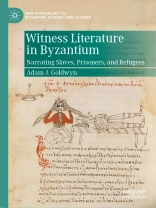This book analyzes Byzantine examples of witness literature, a genre that focuses on eyewitness accounts written by slaves, prisoners, refugees, and other victims of historical atrocity. It focuses on such episodes in three nonfictional texts – John Kaminiates’ Capture of Thessaloniki (904), Eustathios of Thessaloniki’s Capture of Thessaloniki (1186), and Niketas Choniates’ History (ca. 1204–17) – and the three extant twelfth-century Komnenian novels to consider how the authors’ positions as both eyewitness and victim require an interpretive method that distinguishes witness literature from other kinds of writing about the past. Drawing on theoretical developments in the fields of Holocaust and Genocide Studies (such as Giorgio Agamben’s homo sacer and Michel Foucault’s biopolitics) and comparisons with modern examples (Elie Wiesel’s Night and Primo Levi’s If This is a Man), Witness Literature emphasizes the affective, subjective, and experiential in medieval Greek historical writing.
Зміст
1. Bearing Witness in Eustathios of Thessaloniki’s
Capture of Thessaloniki: Holocaust Literature and the Narration of Trauma in Byzantium.- 2. Prison Literature and Slave Narratives in Byzantium: John Kaminiates’
Capture of Thessaloniki.- 3. The Carceral Imaginary in Byzantium: The Komnenian Novels as Holocaust Fiction.- 4. The Refugee as Historian: Niketas Choniates and the Capture of Constantinople.
Про автора
Adam J. Goldwyn is Associate Professor of English at North Dakota State University. He is the co-editor of
Mediterranean Modernism: Intercultural Exchange and Aesthetic Development (Palgrave Macmillan, 2016) and author of
Byzantine Ecocriticism: Women, Nature, and Power in the Medieval Greek Romance (Palgrave Macmillan, 2018).












